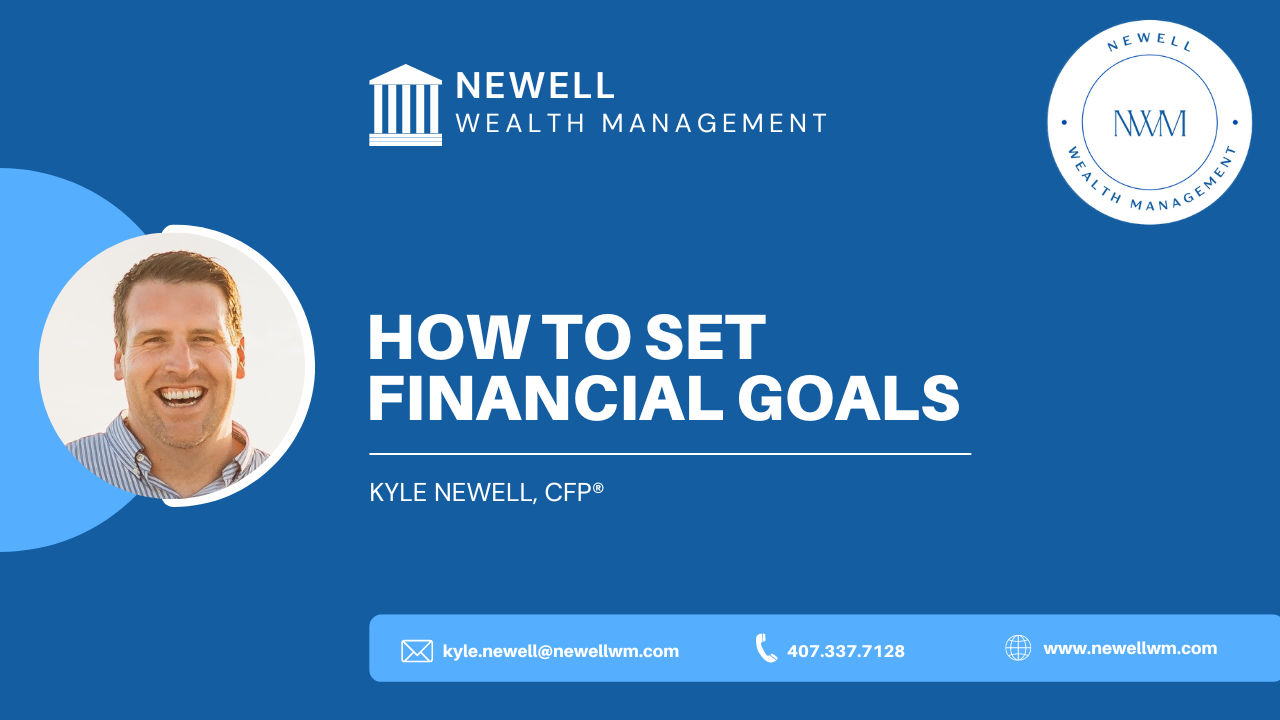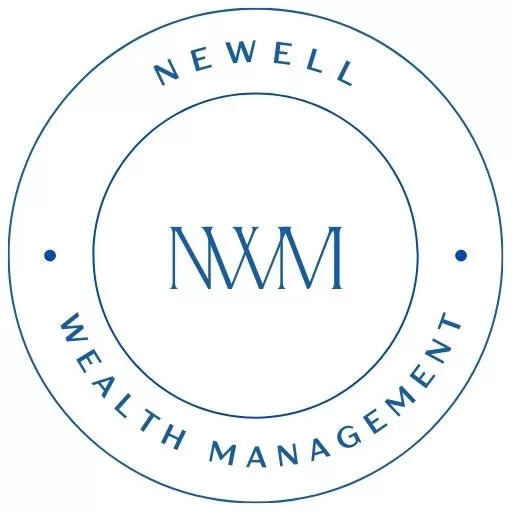How to Set Financial Goals

Happy New Year! This time of year is all about New Year’s Resolutions. A new year means a fresh start, and it’s a time to reflect on where we are and where we want to go. There is often a lot of excitement about a new year. We set goals and outline a lot of steps to take to get us there. You may be thinking about the best way to set financial goals in the new year.
Many of my clients are asking some common questions.
1) How do they know if they’re on track for retirement?
2) Are they using the right investment strategies?
3) Are they taking advantage of tax efficiencies?
These are all great questions. Ultimately, it would be best to think about how you want your overall financial picture to look. What are you trying to accomplish? How do you plan to achieve it? I encourage you to choose one thing to work on for at least the first quarter of the year. Once you have a handle on that, you can add other focus items. A good starting point is making sure you understand basic investment option definitions.

What is the Market?
Many times, when I meet with clients, the topic of the market going up or down is discussed. I find that often, they need clarification about what that means in real terms.
My wife and I love going to the farmers market on the weekend. There are all sorts of booths with people selling goods and services. Imagine you are going to the farmers market to buy carrots. There are two different vendors selling carrots. One is priced at $2.50 per bunch. The other is $1.50. Multiple sellers mean there are options to price shop. The more people selling, the lower the price of carrots. Most people, myself included, would purchase the $1.50 carrots.
Those carrots were so good that you decided to return next week and get some more. This time, however, there is only one vendor selling carrots. With no competition, they are now $10 per bunch. You now must decide whether carrots are necessary for your salad and if you are willing to pay the price to have them.
The stock market is when you’re talking about trading an individual stock that you can own as an individual investor. One share of Disney, for instance. If you want to sell your share, there has to be somebody on the other side of the table that wants to buy Disney. Because Disney is such a large company, there are lots of people that want to buy Disney. There are also lots of people who want to sell it.
When we talk about the stock market, instead of a one-to-one transaction like the farmers market, you’re talking about hundreds of thousands of people worth hundreds of millions of dollars potentially. Each person is doing an individual trade, buying or selling. It’s the same with a bond market as well.
When the market goes up, it generally means more people want to buy the stock than those who want to sell it. When the market goes down, more people want to sell the stock than buy it. If more people want to sell rather than buy, the people buying can pick and choose a little more, which drives the market price down.
So just like the example of the carrots, if four or five carrot vendors are selling, it will drive the price down. If it’s just one, they can raise the price. You then must decide if it’s worth it.
The stock market is the same. It mirrors the concept of supply and demand.
More sellers = lower stock prices over time
More buyers = higher pricing over time
There are many different markets, but two are primarily discussed when we talk about the market.
- S&P 500: 500 of some of the biggest companies in the U.S.
- Dow: Around 30 individual companies
These are different indexes that track what the market is doing. They consider what the buyers and sellers think about the individual investments they’re making and whether they want to sell or buy.
What they determine will decide whether the price goes or up or down. For simplicity’s sake, you usually buy if you think it will be a good investment or sell if you don’t.
What is a stock?
I am asked by clients all the time what the appropriate investment strategies are and what they should be doing with their money. They know they should invest but worry that stocks may be too risky. Before going into specific answers, I like to ensure they understand the fundamental unit of investment – stocks.
The end unit we usually discuss is one individual stock in a company. So, what is that? In the simplest terms, when you own stock in a company, you own part of the company. How the company does will be a significant determinant of how your underlying investment does.
Suppose you own one share of a company that’s increasing its revenue and profitability or opening up new lines of business and new markets. In that case, all of those things might increase the value of the stock. If you own a stock that is losing market share, losing revenue, or not being sustained, profitability is getting reduced. These might cause the stock to lose value.
What is a bond?
Because investments are used to help you attain your financial goals, it’s also important to understand another type called bonds. Bonds are a topic that many people are very confused about, but they can be defined relatively simply.
They are often viewed as more conservative investments than stocks. This may or may not be accurate based on how you view the risk. In the simplest terms, a bond is a loan to a company or the government.
For example, if a company wants to build a new facility and doesn’t want to use its own money to do it. The company will ask to borrow money from individual investors or institutions to get the money. Think about when you bought your house for a moment. You probably went to a mortgage lender or bank to get a loan for the purchase. The difference here is that rather than getting one large loan from a bank, the company breaks the amount into smaller chunks that an individual could buy, like $1,000 or $5,000.
They borrow the money for a specified amount of time, say ten years, with a few percent interest. They will give you the money back at the end of that term. It sounds like a pretty good deal, except that it’s based on how likely the company or government will be able to pay you back.
To whom you are loaning the money is the risk with bonds. Much like, if you have a borrower or person with a very low credit score, the bank will charge a higher interest rate vs. what a person with a sound credit score will pay.
It’s the same thing with companies. If you’re loaning money to a company that may go bankrupt, you probably get a high-interest rate, but you also might lose out on your principal. The other risk with bonds typically is based on what the interest rates are doing. There is a lot involved with interest rates, so I will save that for another day.
What are mutual funds?
If you have been researching investments to help with your financial goal setting, you’re probably starting to wonder which stocks you should invest in. Should it be Apple, Google, Disney, or other companies? Perhaps you’d rather do some bond investing. How do you find which bonds to invest in?
If you want to invest $1,000 or $1,000,000, finding the right individual stocks and bonds to buy and invest in becomes challenging and a lot of work. As a result, some time ago, mutual funds were created.
Mutual funds were created to take your $10,000, my $10,000, and Tom’s $10,000, put it all in the pot together, and hire somebody that knows how to investigate individual stocks and bonds to find the right investments.
There are many types of mutual funds that focus on specific things:
- Big companies
- Small companies
- International companies
- Specific sectors like financial, technology, utilities, etc.
There are 1000s of mutual funds out there. Usually, a person or research team does the underlying research to figure out the best stocks and bonds to invest in based on what the market says they will do.
Begin with the end
Where do you start to set financial goals? I like to respond with a popular quote.
“Begin with the end in mind.”
– Stephen Covey
Follow a few simple steps to get your goals set and start 2023 with a plan.
1) Ask yourself some questions.
- What are my short and long-term goals
- What are the results I want to see
- What am I trying to accomplish
2) Work your way backward
For most of my clients, the end goal is retirement. They want to retire, but they don’t know where to start or how to plan. Try this planning strategy.
- Paint a picture of what your goal looks like
- Walk back from the end result to where you are now
3) Look at the gap and take action
What does the gap between now and your goal look like? This is the step where you create a concrete, actionable plan to help you take action and move toward your end result. Feel confident in your efforts. Always keep your end result in mind.
Understanding the fundamental concepts of investing, and working with your financial planner, can help you create a plan to reach your financial goals in 2023 and beyond. If you are unsure about or need guidance with your financial goal setting, I’m here to help.
Important Information
Newell Wealth Management, LLC (“NWM”) is a registered investment advisor offering advisory services in the State of FL and in other jurisdictions where exempted. Registration does not imply a certain level of skill or training. The presence of this website on the Internet shall not be directly or indirectly interpreted as a solicitation of investment advisory services to persons of another jurisdiction unless otherwise permitted by statute. Follow-up or individualized responses to consumers in a particular state by NWM in the rendering of personalized investment advice for compensation shall not be made without our first complying with jurisdiction requirements or pursuant an applicable state exemption.
All written content on this site is for information purposes only and is not intended to provide specific advice or recommendations for any individual. Opinions expressed herein are solely those of NWM, unless otherwise specifically cited. Kyle Newell and NWM are neither an attorney nor an accountant, and no portion of this website content should be interpreted as legal, accounting or tax advice. Material presented is believed to be from reliable sources and no representations are made by our firm as to other parties’ informational accuracy or completeness. There is no assurance that the views or strategies discussed are suitable for all investors or will yield positive outcomes. Investment involves risks including possible loss of principal and unless otherwise stated, are not guaranteed. Any economic forecasts set forth may not develop as predicted and are subject to change. All information or ideas provided should be discussed in detail with an advisor, accountant or legal counsel prior to implementation.
